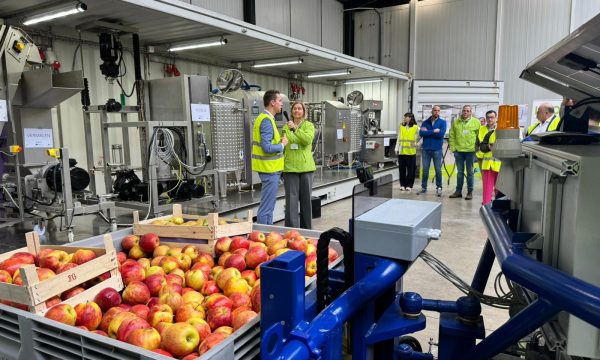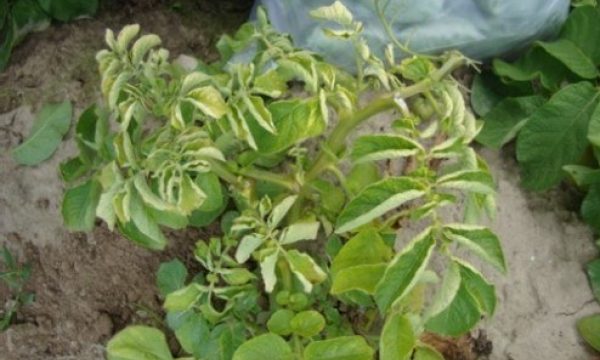Press release Flemish peer surprisingly surrounded by technology
The Flemish agri-food chain is strongly supported in its pursuit of sustainability by innovative techniques. This certainly appears to be the case in the important pear sector: circularity, renewable energy, smart water use and adaptation to climate change are an ambition of numerous experts and researchers. At the Flanders Technology & Innovation Festival, 5 knowledge centers in the Belorta Fruit Auction in Borgloon are unpacking diverse and remarkable results. Minister of Economy, Innovation, Work, Social Economy and Agriculture Jo Brouns, present at the press event in Borgloon, stressed among other things the importance of innovation for the primary sector and also the importance of STEM education: 'Training and finding qualified personnel is an important challenge for the Limburg fruit companies.'
VITO puts precision agriculture and climate-smart water use on the Flemish map
VITO combines drone images and satellite data on the one hand with weather data and machine data on online data sharing platforms on the other, into applications for a sustainable, more precise cultivation approach. In addition, VITO also focuses specifically on water: with sensors and probes, they are able to monitor the available water sources to ensure climate-robust water use in fruit cultivation. Jürgen Decloedt, VITO: 'Our new methods for collecting and interpreting raw agricultural data lead to practical advice for growers.'
UCLL demonstrates its automatic-riding pallox cart
University College UCLL (University Colleges Leuven-Limburg) has developed an affordable autonomous palox transport platform that can safely navigate an orchard. This can ease the labor-intensive work of fruit producers. A demo will be organized at FTI. There are now concrete plans to further develop the transport platform into a more multi-purpose vehicle. By expanding the transport and lifting capabilities into a multifunctional system that can autonomously perform multiple orchard tasks, UCLL together with KULeuven, pcfruit and the fruit sector wants to integrate the technology into future autonomous agricultural vehicles.
Pcfruit (now Viaverda) investigates what pear trees will look like in 2050
The pear tree subproject is a component in Ecotron. That is the research setup that Uhasselt has developed in Genk. The expected climate of 2050 is simulated there in mini-ecosystems: What happens, for example, to a pear tree if it has to deal year after year with irregular precipitation, rising temperatures and higher CO2 levels? The Research Center for Fruit Growing and the Flemish Center for Conservation of Horticultural Products are research partners for the Ecotron subproject. 'We are calculating the impact of climate change on the growth and quality of pears. The first results show that pear orchards in Flanders will use approximately 5000 tons of extra CO2 annually by 2050. With this, they can contribute positively to the solution to climate change. At the FTI-Hasselt festival, the researchers communicated about the Q-pear, Waterproof and Smart Growers projects, among others.
Climate leader (Boerenbond) in pear cultivation sector
A pear grower can store more carbon in the soil and trees of his orchard than is released by his planting machines and (economical) refrigeration units on the farm. That's according to studies by KULeuven and ILVO commissioned by Boerenbond. One of the fruit growers who makes great efforts to reduce the climate impact on his farm is Mark Nickmans. He has been declared Climate Leader in Flanders. Elisabeth Mertens, Boerenbond: 'Flemish pear cultivation is climate-neutral, and the many innovations in the sector ensure that Flemish farmers and horticulturists farm well both economically and ecologically.' More punishing climate figures on agriculture can be found in the 'Boerenbond climate brochure'.
ILVO helps pear (and other fruits and vegetables) toward zero-waste
Within the framework of the European research project ZeroW, ILVO is demonstrating at the company Fructus, (next to the fruit auction) an experimental high-tech juicing container and a super flexible juice & smoothie production line for mixed surplus fruits and vegetables. This will make it more feasible to convert relatively small-scale and especially diverse surpluses into long-life, pure, healthy juices or smoothies. For food banks, among others, this is good news in the long run. As a recognized charity, they are offered the auction surpluses free of charge. But logistically distributing fresh produce is a tough job for them. Juice would give them more time. For auctions and growers with peak surpluses, versapping is also a possible widening opportunity. ZeroW has upgraded technological and nutritional knowledge to precisely address smaller and especially varied food loss streams.
BelOrta auction cooperative starts new high-tech sorting line
BelOrta opened its new sorting center for hard fruit in Borgloon more than six months ago. The infrastructure uses advanced technologies such as optical and infrared cameras for accurate quality assessment. The scanning installation is ingenious: after the first scan, the pears are turned over for a second scan on the other side, allowing for optimal sorting. 'The automated sorting center for apples and pears now has a capacity of 60,000 tons per year. It brings the fruit auction to the global level of marketers of apples and pears.'
About FTI Hasselt
The FTI festival in Hasselt will take place from March 16 to 21 in and around the Hasselt region. The aim is to let young people and the general public experience how far Flanders has come when it comes to circularity, mobility, food and urban culture.. www.ftihasselt.be



